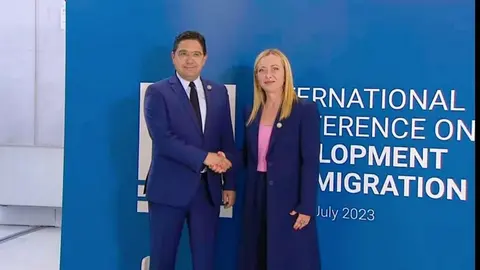Morocco implements a new strategy to fight against school drop-outs

Dropping out of school is a major problem in the Moroccan education system and a key challenge for the Moroccan authorities. In the 2021-2022 school year, more than 300,000 pupils dropped out of school. Statistics show that these pupils fall into three different categories. Firstly, those who dropped out during the school year accounted for 15 % of the total number of pupils in the 2021-2022 school year. Secondly, 30.4 % of the total number of students did not enroll, whether they were admitted or repeaters. Lastly, the largest proportion of pupils dropping out of school were those who had left following the decisions of the class council at the end of the school year (54.6 % of the total number of pupils).
The highest number of drop-outs is recorded at the secondary school level (183,893), although the other levels of education also experience a significant number of drop-outs. In 2021-2022, there counted 76,233 school leavers in primary school and 74,538 in high school.
According to Maroc diplomatique, this situation raises many questions about the causes contributing to the increase in this problem. Poverty is obviously one of the main factors, but it is not the only catalyst. The socio-economic environment is also a crucial parameter to be taken into account, as are negative school experiences, a difficult territorial context and an unfavourable school environment. The newspaper L'Observateur also notes early marriage and child labour as major causes of school drop-out.

In May 2023, at a meeting in the House of Representatives, the Haraki Group called on the government to adopt a genuine public policy dedicated to young people. It stated that no country can achieve development without relying on the vital energies of young people, by guaranteeing employment and dignity for young people, who make up a third of society.
On Monday 24 July 2023, at a new session in the House of Representatives, Minister Chakib Benmoussa stated that the Ministry is working to reduce the school drop-out rate by almost a third by 2026. To achieve this, the ministry's new strategy calls for a broadening of school provision, through local schools and social support services such as school transport.
By 2022-2023, the Ministry will have recovered 65,944 pupils, significantly reducing the drop-out rate. These results have been achieved by expanding the number of school complexes, which now total 11,909, including 6,595 in rural areas, divided between 8,280 primary schools, 2,185 secondary schools and 1,444 high schools. There has also been a significant increase in the total number of teachers nationwide, reaching 269,015 active teachers, an increase of 2.7 % compared to the 2021-2022 school year. The number of teaching units is between 4,000 and 5,000, of which around 2,000 are provided by the National Initiative for Human Development. Finally, the increase in social support has enabled 1,270,078 pupils to benefit from the school meals programme, 126,116 from boarding school services, 570,748 from school transport and 4,401,328 pupils from the "One million school bags" royal initiative.

However, dropping out of school is a phenomenon that mainly affects rural areas. In 2021-2022, school dropouts in rural areas reached 129,594, or around 4 % of the total. Access to school also remains difficult for girls, whose dropout rate is estimated at 5.6 %, or around 76,000 schoolgirls in 2020-2021. To this end, the Ministry is seeking to promote education in rural areas. It plans to open 203 additional schools over the next few years, including 130 in rural areas. By developing new educational complexes in rural areas, Rabat is promoting access to schools for children living in isolated or remote villages.
The budget of the Ministry of National Education, Pre-school and Sports amounts to 1.5 billion dirhams this year. It also plans to increase the number of second-chance centres and provide the educational support needed to reduce the school drop-out rate.









